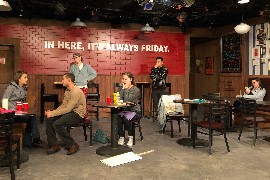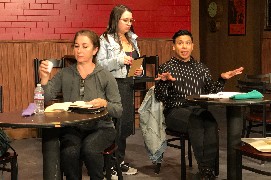
As any Los Angeles theater aficionado can tell you, the L.A. theater scene thrives on its hundreds of under-100-seat houses that allow experienced professionals to hone their craft between better paying film, TV, and commercial gigs that don’t always offer the satisfaction that bigger, meatier intimate theater roles can provide.
 Plus, as any actor worth his salt will tell you, nothing beats playing a role from start to finish in front of a live audience without a director shouting “Cut!”, the need for retakes, or the benefit of bloopers.
Plus, as any actor worth his salt will tell you, nothing beats playing a role from start to finish in front of a live audience without a director shouting “Cut!”, the need for retakes, or the benefit of bloopers.
While the vast majority of intimate theaters pay their actors, it’s minimum wage at most, and more often than not, a stipend limited by theater rental cost, ticket prices, number of seats, generosity of donors, etc.
All of this means that when actors book paying gigs, they say yes (wouldn’t you?) and leave theaters with a dilemma, to cancel a performance or go on with an understudy, that is assuming they’ve even got an understudy, which is frequently not the case.
Theater companies that do choose to have covers (a common synonym for understudy) generally guarantee them at least one performance as incentive for putting in so much work for a mere pittance, and traditionally this has meant having individual understudies join the main cast at scattered dates throughout the run.
 In recent years, however, a number of major intimate theaters have begun to double-cast all roles, assigning an associate director to work with the understudies (or alternate cast, as they are most frequently known these days) and giving the understudy/alternate ensemble their own full-cast dedicated evenings or matinee dates.
In recent years, however, a number of major intimate theaters have begun to double-cast all roles, assigning an associate director to work with the understudies (or alternate cast, as they are most frequently known these days) and giving the understudy/alternate ensemble their own full-cast dedicated evenings or matinee dates.
Not only does this provide added incentive for alternates to sign on the dotted line, an alternate cast guarantees that when a main-cast member calls out, a fully-prepared performer is there to step in and save the day.
Burbank’s Victory Theatre calls its alternates the “2nd Company” and gives them four midweek performances, whose audiences have come specifically to see the alternates, i.e. no one will be disappointed to hear the dreaded words, “At tonight’s performance, the role of so-and-so will be played by …”
Under Herb Hall’s assured 2nd Company direction, Victory Theatre audiences now get to experience every laugh, every surprise, every bit of drama and suspense offered by the currently running Elijah, but with an entirely different sextet of actors making Judith Leora’s multidimensional roles very much their own.
While Hall adheres to director Maria Gobetti’s blocking, he’s allowed his cast to find their own beats, their own shadings, their own line deliveries, and for anyone who goes back to experience the alternates, or sees the 2nd Company and then decides to return for the main ensemble, the simple fact that different types, different looks, and different ethnicities have been cast means a distinctly different but equally satisfying Elijah.
 Rachel E. Crane’s likable, homespun Lori contrasts effectively with Melanie Abrams’ sulky, pouty, achingly vulnerable teenage Ashley while Quentin Boyer gives Greg an irresistible Ryan Gosling/Jake Gyllenhaal boy-next-door appeal opposite a terrific Ashley Currie as his increasingly distraught girlfriend Dawn.
Rachel E. Crane’s likable, homespun Lori contrasts effectively with Melanie Abrams’ sulky, pouty, achingly vulnerable teenage Ashley while Quentin Boyer gives Greg an irresistible Ryan Gosling/Jake Gyllenhaal boy-next-door appeal opposite a terrific Ashley Currie as his increasingly distraught girlfriend Dawn.
As for the play’s Red State/Blue State opposites, while the main cast pits an African-American born-again pro-death penalty advocate against a WASPy gay New Yorker in town to protest the impending execution that she has come to cheer on, the 2nd Cast’s dynamic duo–Candy Potts’ white Southern Baptist and Jerry Hernandez’s gay Latino Tim–give the very same characters quite different back stories.
 Donna Preacher-Hall is 2nd Company assistant director.
Donna Preacher-Hall is 2nd Company assistant director.
Though most theatergoers will likely opt to see one Elijah cast or the other (and be guaranteed a fine production either way), those who make a return visit to the Victory to see an entirely new group of actors will be richly rewarded by a second look.
www.thevictorytheatrecenter.org
–Steven Stanley
December 11, 2019


 Since 2007, Steven Stanley's StageSceneLA.com has spotlighted the best in Southern California theater via reviews, interviews, and its annual StageSceneLA Scenies.
Since 2007, Steven Stanley's StageSceneLA.com has spotlighted the best in Southern California theater via reviews, interviews, and its annual StageSceneLA Scenies.







 COPYRIGHT 2024 STEVEN STANLEY :: DESIGN BY
COPYRIGHT 2024 STEVEN STANLEY :: DESIGN BY